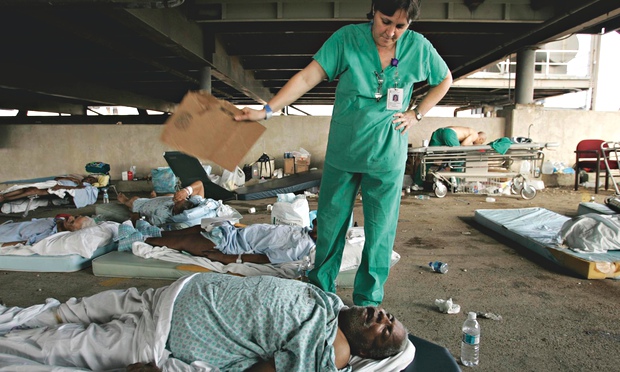Hurricane Katrina: Healthcare Perspective

Image Retrieved from: http://www.theguardian.com/world/2014/feb/07/hurricane-katrina-after-the-flood
Hurricane Katrina was the most destructive “natural” disaster in US History. It impacted about 90,000 square miles and displaced over two million people. The healthcare infrastructure in New Orleans ranked among poorest in the nation and the hurricane greatly impacted the healthcare infrastructure. Hospital basements were flooded and medications, food, equipment and supplies were lost. Electrical systems were destroyed and hospitals eventually ran out of fuel to power their generators. For many hospitals running water was not available and sewage systems did not function and communication was not possible. Food had to be rationed among individuals in the hospital and more problems occurred by additional patients seeking care and other members looking for temporary shelter. There were 16 hospitals in the New Orleans area and 8 were closed permanently. Of the practicing doctors 2,000 of the 3,500 were displaced. The available resources were insufficient to care for the community and affected individuals after the hurricane (Rodriguez and Aguirre, 2006).
The hurricane affected the quality of care of many patients. Not having running water inhibited hand hygiene putting patients at risk of HAI’s. Not having a running sewage system also did not work in their favor. Medications were not available, beds, and chaos occurred. The hospitals were filled to their maximum capacity and they were probably short staffed. The Hurricane depleted all the hospitals stores and not being able to communicate and know when assistance was on their way must have been a frustrating situation. Eventually other states, government, the Red Cross, volunteers, etc… were able to help and it has been a long journey in making New Orleans what it was before the disaster.
I cannot imagine being a nurse in this situation. It must be very frustrating knowing that your patient needs care and you are not able to provide it because you do not have the necessary supplies. Also it would be important to prioritize care and provide comfort measures. Also non-pharmacological interventions would be necessary due to lack of medications. It would be very difficult to be a nurse in this situation, but very rewarding. In order to be able to function properly you need to be organized, calm, and think out of the box. We all need to be prepared for any kind of disaster. After Hurricane Katrina, a few more hurricanes have occurred and the response has been better. I believe that we are now more prepared for any disaster, but we will never fully be prepared.
References:
Rodriguez, H. and Aguirre, B.E. (2006). The impact of hurricane Katrina on the medical and healthcare infrastructure: A focus on disaster preparedness, response, and resiliency. Disaster Research Center (DRC) University of Delaware. Retrieved from: http://udspace.udel.edu/bitstream/handle/19716/2380/Australia%20PP%20-%20Havid%C3%A1n%20DSPACE%20READY.pdf?sequence=1
